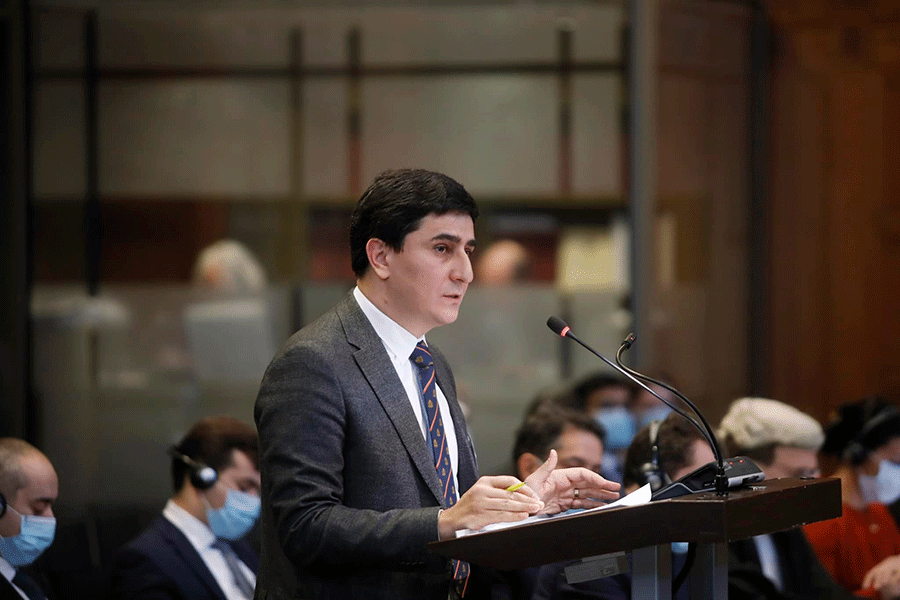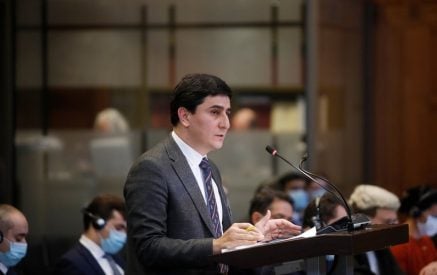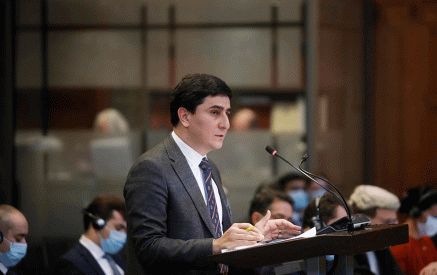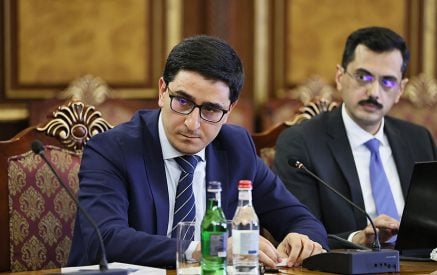Head of the Office of The Representative on International Legal Matters Yeghishe Kirakosyan delivered opening remarks during a hearing of Application of The International Convention on the Elimination of All Forms of Discrimination (Armenia V. Azerbaijan) in International Court Of Justice, The Hague, The Netherlands, on April 16, 2024. He spoke on it during oral proceedings on the preliminary objections raised by Azerbaijan.
Kirakosyan, in particular, said:
On 16 September 2021, Armenia instituted these proceedings against Azerbaijan because of that State’s egregious policies and practices of racial discrimination against ethnic Armenians. As Armenia explained in its Memorial, Azerbaijan’s government has for decades cultivated an echo chamber of racist hatred against ethnic Armenians. The children of Azerbaijan are taught to hate and kill Armenians in their school textbooks. The State media spews vile hate speech. Public officials dehumanize ethnic Armenians and call for their complete elimination. This is the pervasive State-sanctioned racism that Azerbaijan’s counsel dismissed yesterday as “so-called” Armenophobia. A climate in which literal axe murderers are awarded, promoted, and glorified as national heroes for killing Armenians in peace time.
This longstanding State policy of racial hatred came to a violent head in September 2020 when Azerbaijan launched a war of aggression against the ethnic Armenians of Nagorno-Karabakh. The stated goal was to eliminate and expel ethnic Armenians from their homeland. As President Aliyev later revealed [QUOTE] “Hatred for the enemy … was driving us forward” [UNQUOTE]. For 44 days, Azerbaijani soldiers systematically murdered, tortured, and abused ethnic Armenians. They gleefully filmed themselves carrying out unspeakable acts of violence against ethnic Armenian civilians and prisoners of war, all while shouting racial slurs and insults. Through this violence and intimidation, Azerbaijan ethnically cleansed large swathes of Nagorno-Karabakh in 2020, expelling at least 30,000 people from their homes. President Aliyev declared victory, proclaiming that no songs would be sung in Armenian in those lands ever again.
Read also
In the aftermath of these shocking atrocities, which were the culmination of decades of racial discrimination against ethnic Armenians, Armenia sought accountability under the CERD. Importantly, Armenia also sought the Court’s urgent protection for those vulnerable ethnic Armenians who, at that time, had not yet been killed or expelled from their homeland.
Mr. President, Members of the Court, we all know what has happened since then. To the deep regret of Armenia and the international community, not even the Court was able to stop the tide of Azerbaijan’s racist campaign of ethnic cleansing. In September 2023, after starving the ethnic Armenians of Nagorno-Karabakh for nine months by blocking the Lachin Corridor, in flagrant violation of the Court’s first two Orders on Provisional Measures, Azerbaijan launched an unprovoked attack, killing hundreds and forcing over 100,000 ethnic Armenians to flee their ancestral homeland. To this day almost 200 remain missing, and their families suffer without knowing the fate of their loved ones. Just as with the Court’s previous Orders, Azerbaijan remains in defiance of the Court’s third Order of 17 November 2023. It has done nothing to [QUOTE] “ensure that persons who have left Nagorno-Karabakh after 19 September 2023 and who wish to return to Nagorno-Karabakh are able to do so in a safe, unimpeded and expeditious manner.” [END OF QUOTE] After threatening to do so for years, Azerbaijan has completed the ethnic cleansing of the region and is now consolidating it by systematically erasing all traces of ethnic Armenian presence, including Armenian cultural and religious heritage. All this is happening while this case is pending before you. Just last month, President Aliyev lit a bonfire in Stepanakert, Nagorno Karabakh, and tweeted that the bonfire was [QUOTE] “doing the final cleaning.”
Mr. President, Members of the Court: this is the context in which Armenia is pursuing claims against Azerbaijan under the CERD.
Faced with Armenia’s claims and the overwhelming evidence against it, Azerbaijan has desperately sought to introduce a false sense of parity between the Parties by instituting its own case against Armenia. But the challenge for Azerbaijan is that it has no videos of racist atrocities to show and no pervasive hate speech by public officials to quote. So, what has Azerbaijan done? It has resurrected three-decade-old historical grievances that clearly fall outside the temporal scope of the Court’s jurisdiction. Just yesterday we heard Azerbaijan misrepresenting an early twentieth century national ideology as racist, which has nothing to do with the mainstream political realities in Armenia today. Azerbaijan has also introduced outlandish claims about alleged environmental damage that have nothing to do with racial discrimination. And it is even attempting, for a third time, to convince the Court that its allegations about landmines fall within the scope of the CERD.
As Armenia will explain during the hearings that begin next week, the vast majority of Azerbaijan’s claims fall squarely outside the Court’s jurisdiction. Yet again, however, Azerbaijan is pursuing its same tired strategy of mirroring and whataboutism. It is undoubtedly aware of the jurisdictional challenges faced by the case it has brought against Armenia and it is now desperately attempting to convince the Court that Armenia’s case also faces jurisdictional hurdles. But nothing could be further from the truth. In light of the manifest weakness of its Objections, Azerbaijan is simply hoping that the two sets of objections will cancel each other out.
Mr. President, Members of the Court, this is a cynical strategy of last resort. As Armenia will explain today, neither of Azerbaijan’s objections stands up to even cursory scrutiny, and its tactic must fail.
Azerbaijan’s First Objection is simply not serious. Not only does Azerbaijan’s understanding of the negotiation requirement of Article 22 turn the Court’s jurisprudence on its head, Azerbaijan’s presentation of the facts also distorts reality. What Azerbaijan refers to as “negotiations about negotiations” was in fact an agenda imposed by Azerbaijan with the sole purpose of prolonging negotiations for as long as possible. What Azerbaijan refers to as a “confidence-building” exercise, was happening at a time when the Azerbaijani army was still expelling ethnic Armenians from their homes. While Azerbaijan was making a so-called “proposal for joint action”, it was also torturing ethnic Armenian detainees, and destroying Armenian cultural heritage. While Azerbaijan, as it claims, was making “progress” in negotiations it was opening its military trophies park and ridiculing ethnic Armenians with racist mannequins. Mr. President, Members of the Court, in such a context, one year of negotiations was one year too many. Armenia nevertheless negotiated with Azerbaijan in good faith and pursued discussions far beyond the point of futility. Armenia has fulfilled the requirements of Article 22 in letter and spirit, and Azerbaijan’s First Objection fails.
Azerbaijan’s Second Objection is also without merit. Unable to even argue that the vast majority of Armenia’s claims fall outside the Court’s jurisdiction, Azerbaijan attempts to convince the Court that a subset of Armenia’s claims concerning violence, detention and enforced disappearances have nothing to do with the CERD. To do so, Azerbaijan relies on at least two fictions. First, it tells the Court that Armenia simply does not have enough “particularized” evidence of racial animus. Apparently, according to Azerbaijan, for the Court to enjoy jurisdiction, Armenia should prove that each and every instance of violence, detention or disappearance was sufficiently racist. And to do so, it is not enough that Armenia point to a general climate of hate speech, or to the most hateful atrocities, or even to the racist words of the perpetrators themselves. For Azerbaijan, Armenia must prove an elusive “something more”.
Azerbaijan’s other fiction is that Armenia’s grievances fall outside the scope of the CERD because they implicate international humanitarian law. For Azerbaijan, Armenia is unduly attempting to litigate an ordinary armed conflict between two warring States. As I explained, Armenia’s claims concern far more than the 44-day war of 2020. To borrow Azerbaijan’s metaphor, the war itself was only the tip of the iceberg of decades of racist policies and practices. That said, the CERD is not displaced by the existence of armed conflict. How could it be? History has shown us that the most extreme forms of racial discrimination—including persecution, ethnic cleansing and genocide—most often occur in the context of armed conflict. Indeed, as set out in the Convention’s preamble, [QUOTE] “discrimination between human beings on the grounds of race, colour or ethnic origin is an obstacle to friendly and peaceful relations among nations and is capable of disturbing peace and security among peoples and the harmony of persons living side by side even within one and the same State.” [END OF QUOTE] Unfortunately, there is no better example of racial discrimination upsetting peace and security than Azerbaijan’s recent armed aggressions, which resulted in the ethnic cleansing of all of Nagorno-Karabakh. In this context, as Armenia will demonstrate today, Azerbaijan’s arguments come nowhere near establishing that Armenia’s claims are not capable of falling within the scope of the CERD.
Mr. President, Members of the Court, Armenia will organize its presentation today as follows.
First, Mr. Constantinos Salonidis will explain why Azerbaijan’s First Objection that Armenia failed to comply with the negotiation precondition of Article 22 of the CERD is plainly without merit.
Second, Professor Pierre d’Argent will begin Armenia’s submissions on Azerbaijan’s objection ratione materiae by setting forth the well-established legal standard applied by the Court.
Third, Professor Sean Murphy will provide an overview of the pervasive Armenophobia espoused by Azerbaijan, which provides critical context for assessing its objections ratione materiae. He will also explain why the existence of an armed conflict and the application of international humanitarian law does not preclude the jurisdiction of the Court.
Fourth, Ms. Alison Macdonald will then explain why there can be no question that Azerbaijan’s racist violence against ethnic Armenians is, at a minimum, capable of violating the CERD.
Fifth, Mr. Joseph Klingler will make the same demonstration with regard to Azerbaijan’s discriminatory subjection of ethnic Armenians to arbitrary detention.
Sixth, Professor Linos-Alexander Sicilianos will conclude by showing why discriminatory enforced disappearances carried out by Azerbaijan also undoubtedly fall within the scope of the CERD.
Before giving the floor to my colleagues, however, I would like to underscore the importance that the Republic of Armenia attaches to the present proceedings.
Mr. President, Members of the Court, these proceedings concern fundamental human rights, and the dignity and equality of all peoples, regardless of their race or ethnicity. They are about justice for victims, accountability for perpetrators, and truth-telling for posterity. Yet Azerbaijan has been increasingly characterizing Armenia’s human rights claims, whether before this Court or in Strasbourg as some sort of challenge to Azerbaijan’s sovereignty or territorial integrity. It further claims that these proceedings are an obstacle to peace between the two States.
Azerbaijan is profoundly mistaken. Armenia has no claims to Azerbaijan’s territory, and is also committed to establishing the conditions for a genuine and enduring peace. But it cannot be the case that, to quote President Aliyev, “might is right” and “international law does not work”. A state that has carried out gross breaches of human rights cannot simply declare that it has completed its atrocities, and that it is ready to move on. History tells us that lasting peace is built upon justice, accountability, truth, and yes, reconciliation.
Thank you for your attention, Mr. President. May I ask that you please call Dr. Salonidis to the podium.
























































